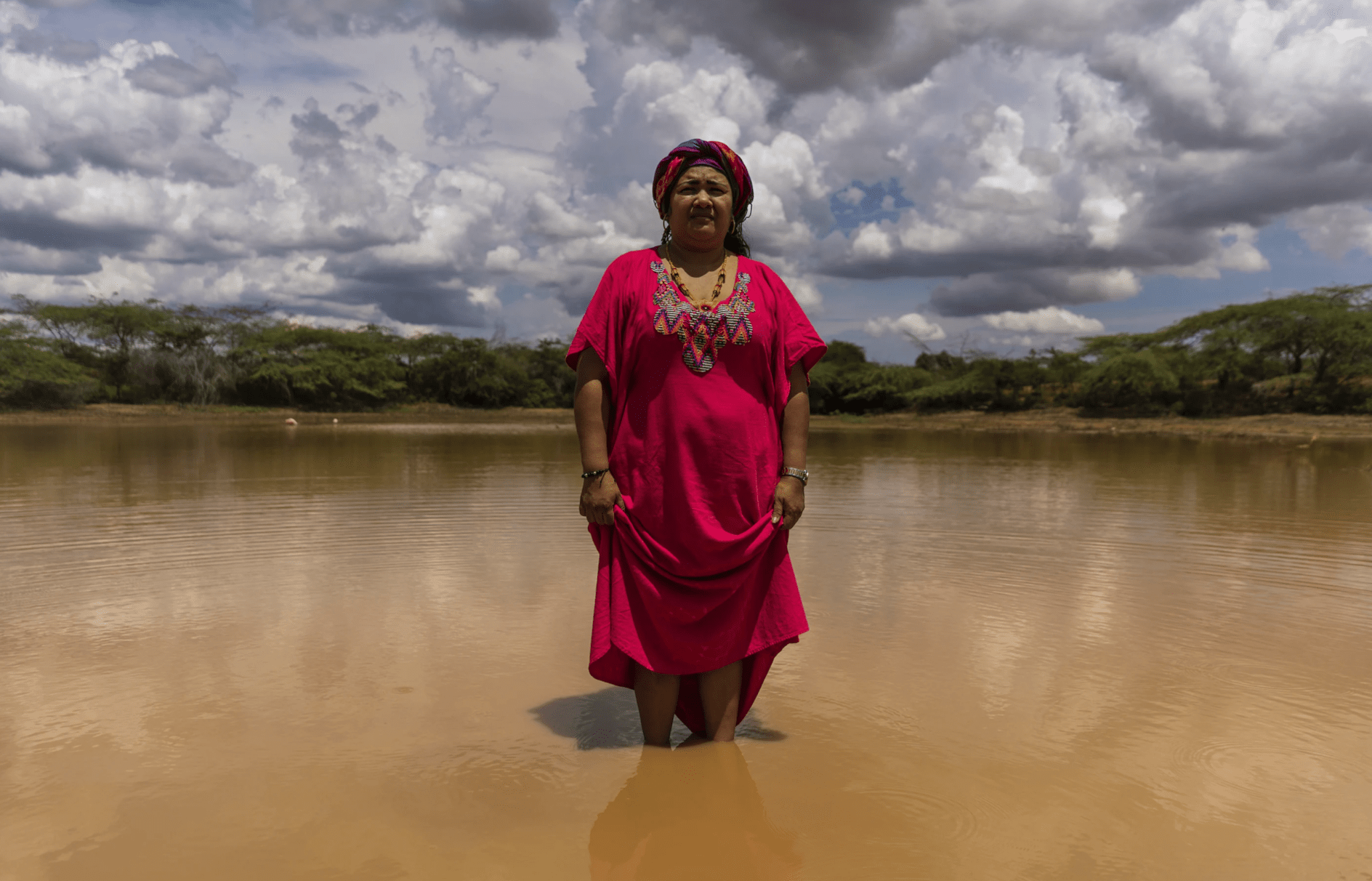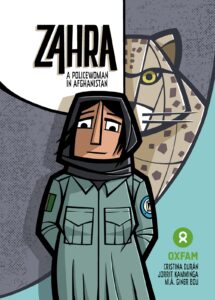MÓNICA’S FIGHT AGAINST THE MINE
Murder, violence, pollution and a business worth billions are threatening the future of the Wayuu people in northern Colombia. But 27-year-old Mónica refuses to be cowed – even if it might cost her life
By RIKKE HOVN POULSEN
COLOMBIA: The atmosphere in the car is tense. Who is the driver? Why doesn’t anyone know him? Can we trust him, or is he secretly working for them?
Mónica wants to switch to the other car, in which she knows everyone: two broad-shouldered bodyguards, the driver, and one of the other leaders from her organization. But there is not enough space for us all. So, for the rest of the trip, we don’t talk about anything important. We can’t put Mónica’s life at risk.
There would have been plenty to talk about – the murders, the threats, the forced displacements – but we will save all that for later. Right now we are heading to one of the world’s largest coal mines, El Cerrejon, in northern Colombia. In the last 30 years it has generated incredible wealth for Western investors. But for the Wayuu people, who have lived in the area for generations, it has brought poverty, pollution, disease and a devastating loss of culture.
That is what Mónica is fighting – even though it puts her own life at risk.
SAYING ALL THE RIGHT THINGS
El Cerrejon produces more than 32 million tons of coal every year. It is around the size of the Danish island Bornholm. Locals are not usually allowed in. But today Mónica has been given exceptional access because she is accompanying Oxfam IBIS and some prominent Western diplomats. The mine’s owners have invited us for a tour, to show us that everything is being done by the book.
“I would ask you not to go off the paths,” says our guide, a company representative. “We are in the process of restoring nature, and you might step on the plants.” Nobody comments on the blatant absurdity of such sudden concern for flowers from a company that has spent decades blasting its way through the earth.
Just across the hill we get a glimpse of what looks like an enormous gravel pit, expanding with every stick of dynamite that is detonated. But we are not allowed to go closer, or stop for photos.
“That area is private property,” the company representative firmly says.
We are allowed to go for a walk in a part of the mine where there is no more coal to dig. Mónica looks over the ruined landscape with indignation. “The Wayuu people have always had a strong connection to our territory,” she says. “The mine has taken that away. It’s like a disease that destroys everything in our environment.”
THE WORLD CHANGED COLOUR
Mónica Lopez is 27 years old. She grew up in the shadow of the mine. It displaced her parents’ village a few years before she was born: the ground beneath the villagers’ feet was full of coal, and the company wanted it. Some of her parents’ neighbours agreed to sell their land, fooled by empty promises of a golden future. Others resisted. The loudest of them soon disappeared. The rest were threatened into silence.
As a child, Mónica saw with her own eyes how life and nature changed. There was no more room for cattle. Crops stopped growing. The clear river water became a cloudy reddish-brown, and no longer good to drink.
The same thing happened to all the villages in the area. Ask any of the residents, and you will hear stories from that time about coercion, violence and abuse. In just one generation, the Wayuu people went from self-sufficiency to poverty and a struggle to survive.
El Cerrejon has become the region’s largest workplace. But it has also made it impossible for the locals to live as they have done for centuries – by hunting, fishing and farming. The mine has taken their land, water, and everything else with value for miles around.
Mónica says she is no longer angry, as she has learned that anger leads nowhere. She channels her energy into fighting for justice as part of Fuerza de Mujeres Wayuu, a group of strong women who travel around creating awareness and mobilizing communities. The organization is finding common ground to unite the Wayuu people – against the mine and other injustices from corporations, corrupt politicians and criminal gangs who all want a bite of this indigenous people’s territory.
“They are wiping out our people,” Mónica says. “We have no choice – we have to fight. For the sake of nature, our families and our children.”
She is well aware of the risks: most of the leaders in Fuerza de Mujeres Wayuu have been threatened, some live under the constant protection of bodyguards, and others went underground years ago. The danger is real. One month ago, in nearby Riohacha, two human rights defenders were shot in the street.
“Although the threats are serious,” says Mónica, “they also strengthen us. I have chosen to see them not as a deterrent, but as a motivation to keep defending our territory. What will happen to our people if we go quiet?”
CHILDREN FEAR THE SOUND OF CARS
After our visit to the mine, Mónica takes us to the village of El Rocio, a few miles away. The community have been displaced three times in the past 20 years. And now the mining company wants them to move once again. The villagers are refusing – even though, as the mine expands towards them, they can feel the ground shake with every new explosion.
“The mining company keeps saying that people here are living off the mine,” says the village’s schoolteacher, Carmen Frias. “But in reality, it’s the opposite. The mine is wiping us out – it is killing us and our way of life. It has destroyed everything.”
Carmen teaches the 15 children who live in El Rocio’s small, scattered tin-roofed houses. She tells us how they suffer from respiratory problems – the mine generates a lot of dust – and a strange rash. Others in the village have developed types of cancer that were previously unknown.
But it’s the fear that worries people most. Last year, masked men attempted to kill the village leader in a drive-by shooting. Pamphlets making death threats against him are circulating through the region. Large cars regularly drive into the village, filled with men who might be security guards, paramilitary operatives or police officers – for the villagers it does not really matter who they are, as they all want to intimidate them into agreeing to move.
“Whenever the children hear a car on the gravel road leading up to the village, they run away and hide,” Carmen says. “They think that this time they might be coming for us”.
So why do the villagers stay?
“For the people at the mine, it’s all about money”, Carmen explains. “But for us, that is not important. This place is more than our home. The earth is our mother. Our land runs in our veins. Our rivers, streams and sacred sites are here. If we move, we lose our roots. We lose our connection to our ancestors and the ancient customs of the Wayuu people. The mine has brought nothing but destruction.”
The young teacher admits that the death threats make her scared, but says they will not silence her: “I’ve been living with the fear since I was ten years old – and I still do. If we don’t do anything now, the same thing will happen to our children. They deserve a better and more peaceful future.”
While their situation seems desperate, there is some hope for El Rocio and the Wayuu people because today they stand together. Unlike 30 years ago, they are no longer trying to fight village by village. They are fighting collectively, together with Mónica and the other human rights activists – filing lawsuits and running information campaigns, from Bogotá to Brussels and Bogense.
More and more people from all parts of the world are hearing about what is happening to the Wayuu people. In October, Mónica and her sisters met with two ambassadors from Europe. They have talked at the UN and met with NGOs and state leaders from around the world. Last year, one of the Wayuu leaders made a speech in London at the general assembly of the company behind El Cerrejon.
The current agreement between the government and the mining company runs until 2034. The mine owners have previously said that they expect their concession to be renewed, but these plans are faltering under global pressure.
“The support from the international community means everything,” says Mónica López. “Our plan is to keep fighting, and keep talking about what is happening to us here in La Guajira. It may be dangerous, but our whole future is at stake.”




